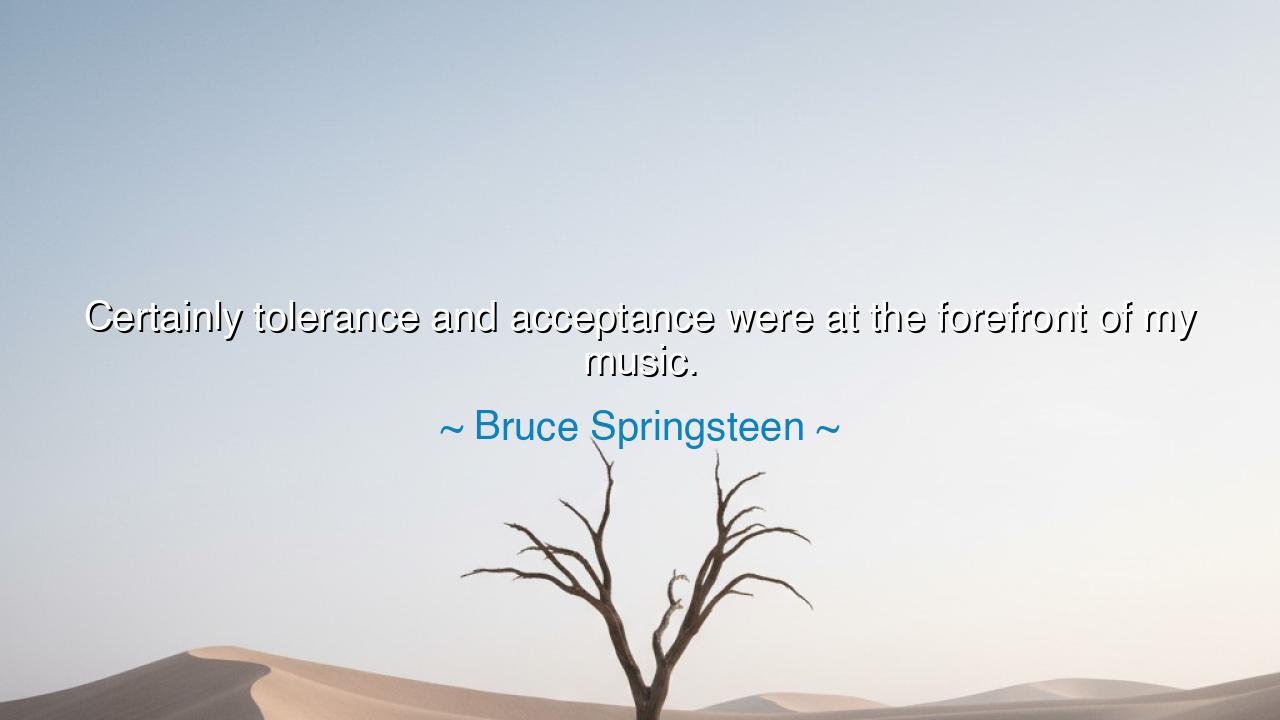
Certainly tolerance and acceptance were at the forefront of my






Hear the words of Bruce Springsteen, troubadour of the working man and chronicler of America’s restless soul, who declared: “Certainly tolerance and acceptance were at the forefront of my music.” In this brief saying lies not only the story of one artist, but the eternal duty of all who lift their voices in song. For music, when it is true, is not meant to divide, but to gather; not to condemn, but to embrace; not to harden the heart, but to open it. Springsteen’s music was not only melody and rhythm—it was an invitation to stand shoulder to shoulder, no matter one’s burden, background, or sorrow.
The ancients too knew this power of song. Among the Hebrews, the psalms were hymns of a people in exile, binding them together in acceptance of one another’s pain and hope. Among the Greeks, the chorus in tragedy spoke with a single voice for the whole of society, reminding men and women that they were not alone. Music has always been the language of tolerance, for it does not ask who you are before it enters your heart. It moves the king and the beggar alike, the conqueror and the captive. Springsteen merely continues this ancient lineage when he places tolerance at the forefront of his work.
Consider the long journey of his songs—tales of factory workers, immigrants, lovers in cars on lonely highways, veterans returning from war. He sang of those forgotten by power, yet he did not scorn them nor glorify them falsely; he embraced them with acceptance. His voice told them: your story matters, your struggle is mine. In this, he echoed the mission of poets across time. Just as Walt Whitman declared, “I am large, I contain multitudes,” so too did Springsteen declare that music must hold room for all, not only the favored few.
History shows us other prophets who used their art as vessels of tolerance. Consider Bob Marley, who proclaimed unity in the midst of division, whose reggae hymns became prayers for peace across nations. Or think of Beethoven, whose Ninth Symphony, setting Schiller’s Ode to Joy, cried out that “all men shall be brothers” at a time when Europe was fractured by war. Springsteen’s words stand in their company, for he too understood that the truest music is not built on walls, but on bridges.
The teaching is clear: tolerance and acceptance are not luxuries of the soul, but necessities. A community cannot endure if its people do not accept one another; a world cannot heal if its nations do not practice tolerance. Music shows us this law in sound: harmony is born when many notes, different yet equal, come together as one. A single note alone is not a song. In the same way, humanity without acceptance is not a society, but a battlefield.
Practical wisdom follows: let your own life carry this music. Listen without prejudice to the voices of others. Seek to understand before you condemn. If you create, let your work embrace rather than exclude. If you live quietly, let your daily words and deeds be instruments of tolerance. Even small acts—hearing another’s story, showing kindness where it is not deserved, forgiving where it is hard—are the music of acceptance in the world.
So let Bruce Springsteen’s words echo as timeless truth: “Certainly tolerance and acceptance were at the forefront of my music.” May we, too, make these virtues the forefront of our lives. For in the end, true greatness is not measured by the noise of victory, but by the harmony of voices joined together. And just as music carries across generations, so too will acts of tolerance and acceptance carry beyond our days, leaving behind not discord, but a song of unity for those yet to come.






AAdministratorAdministrator
Welcome, honored guests. Please leave a comment, we will respond soon